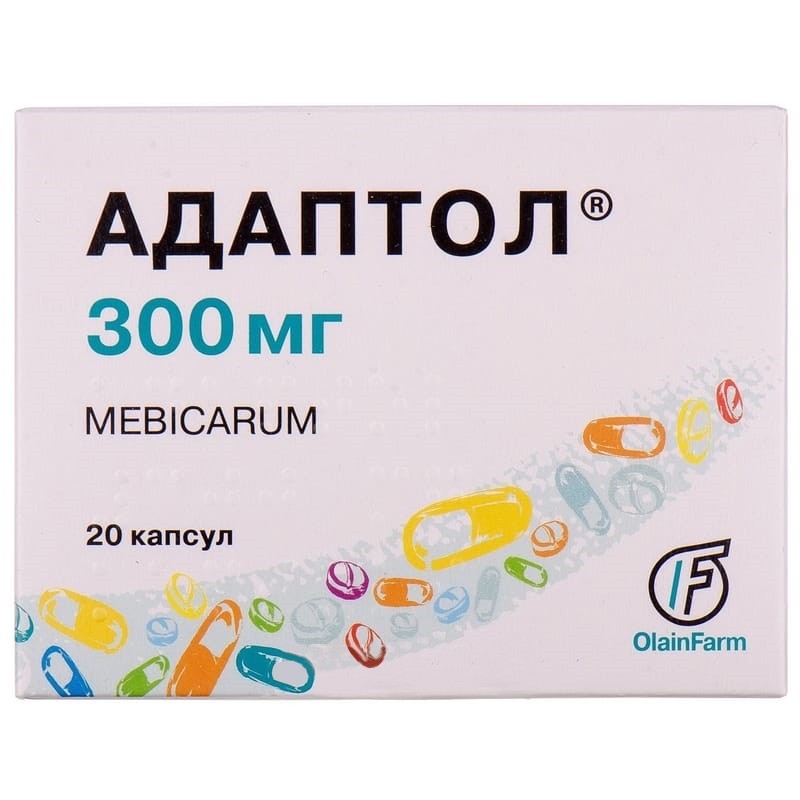



 Secure and encrypted payment processing
Secure and encrypted payment processing We ship to over 40 countries including the USA, UK, Europe, Australia and Japan
We ship to over 40 countries including the USA, UK, Europe, Australia and Japan Guaranteed refund or reship if you haven't received your order
Guaranteed refund or reship if you haven't received your orderthe active substance of the drug adaptol mebicar in chemical structure is close to the bodys natural metabolites - its molecule consists of two methylated urea fragments that make up the bicyclic structure.
Adaptol has moderate tranquilizing (anxiolytic) activity, eliminates or weakens feelings of anxiety, anxiety, fear, internal emotional stress and irritation. The calming effect of the drug is not accompanied by muscle relaxation and impaired coordination of movements. The drug does not reduce mental and motor activity, so Adaptol can be used during the working day or study. The drug does not cause a feeling of high spirits, a feeling of euphoria. On this basis, Adaptol is referred to as daytime tranquilizers. It does not have a hypnotic effect, but enhances the effect of sleeping pills and improves sleep when it is disturbed.
In addition to calming, Adaptol has a nootropic effect. The drug improves cognitive function, increases attention and mental performance, without stimulating the symptoms of productive psychopathological disorders - delirium, pathological emotional activity.
Adaptol has antioxidant activity, therefore, acts as a membrane stabilizer, adaptogen and cerebroprotective agent under oxidative stress of various origins.
Adaptol acts on the activity of structures included in the limbic-reticular complex, in particular on the emotiogenic zones of the hypothalamus, and also affects all 4 main neurotransmitter systems - GABA, choline, serotonin - and adrenergic, contributing to their balance and integration, but does not have peripheral adrenonegative action. The dopamine-positive component is present in the neurotransmitter profile of the action of the drug Adaptol. The drug exhibits antagonistic activity against excitation of the adrenergic and glutamatergic systems and enhances the functioning of inhibitory serotonin and GABA-ergic mechanisms of the brain. It has normosthenic properties.
Adaptol weakens nicotine withdrawal symptoms.
Pharmacokinetics When administered orally, the bioavailability is 77–80%; up to 40% of the drug binds to red blood cells; the rest - 60% do not bind to blood proteins and are in the blood plasma in a free state, in connection with which the drug is widely distributed in the body and penetrates through membranes. Cmax in blood plasma is reached in 30 minutes, a high level of concentration persists for 3-4 hours, then gradually decreases. The drug is completely excreted in the urine during the day, does not accumulate and is not subject to biochemical transformations in the body.
Neuroses and neurosis-like conditions accompanied by irritability, emotional lability, feelings of anxiety and fear; to improve the tolerance of antipsychotics or tranquilizers in order to eliminate the somatovegetative and neurological side effects caused by them; cardialgia of various origins (not associated with coronary heart disease); to facilitate the course of somatovegetative manifestations in premenstrual syndrome and menopause.
Adaptol is indicated as a cerebroprotective agent and adaptogen for emotional and oxidative stress of various origins. As part of complex therapy of nicotine addiction as a means of reducing cravings for smoking.
Adaptol is prescribed orally regardless of food intake. adults 300–500 mg 2-3 times a day. the maximum dose for 1 dose is 3 g, the daily dose is 10 g. The duration of the course of treatment is from several days to 2-3 months. if it is necessary to prescribe the drug for children over 10 years old, it is recommended to use adaptol tablets 500 mg, which can be divided in half to receive a dose of 250 mg.
For treatment with nicotine addiction, the drug is taken at 500-1000 mg 3 times a day daily for 5-6 weeks.
Individual hypersensitivity to mebicar or the components of the drug. During pregnancy and breastfeeding.
Usually the drug is well tolerated.
Disorders from the cardiovascular system: decreased blood pressure.
Disorders from the gastrointestinal tract: rarely - dyspeptic disorders. In this case, it is necessary to reduce the dose of the drug.
Disorders of the respiratory system: rarely - bronchospasm.
Disorders from the skin and subcutaneous tissue: rarely - after taking in high doses, allergic reactions are possible (rash, itching, bronchospasm). In case of an allergic reaction, the drug is stopped.
General disorders: rarely - hypothermia, weakness. With a decrease in blood pressure and / or hypothermia (body temperature may decrease by 1–1.5 ° C), the drug should not be stopped. Blood pressure and body temperature normalize on their own.
Addiction, dependence and withdrawal syndrome with the use of adaptol have not been established.
Caution should be used for impaired liver and kidney function, in patients with arterial hypotension.
Use during pregnancy and lactation. Adaptol penetrates well into all tissues and body fluids. There is not enough data regarding the safety of the drug during pregnancy and lactation, therefore, the appointment of the drug to pregnant and lactating breasts is not recommended.
Children. There is no experience with children.
The ability to influence the reaction rate when driving vehicles or working with other mechanisms. Caution should be exercised when driving, as sometimes the use of the drug can cause a decrease in blood pressure.
Adaptol can be combined with antipsychotics, tranquilizers (benzodiazepines), sleeping pills, antidepressants and psychostimulants.
Adaptol is low toxic. with a significant overdose, it is possible to increase side effects (allergic reactions, dyspeptic disorders, a temporary decrease in hell and body temperature).
Treatment: Conduct conventional detoxification methods, including gastric lavage.
At a temperature not exceeding 25 ° C. Keep out of the reach of children. terms of leave from pharmacies - without a prescription.